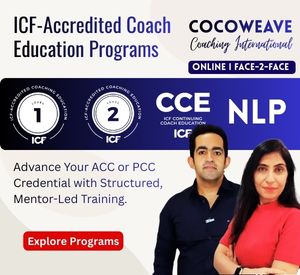Congratulations! You are coach now, and your next client is expected soon! You are understandably nervous as this is your first session! You are very eager to deliver your very best, but you are not sure if you will be able to it take any further than this. How do you make the first impression? What if the client doesn’t like you? How do you create an everlasting impression, and how do you elicit client’s affirmation to book the next session?
No one is expecting it to be love at first sight or that the client will feel instant connectivity, but there is denying that a reasonable amount of comfort level must exist to be able to take things forward. Once the client feels the latter exists, the rest of the things will follow automatically. So what are some of the key attributes that make a great coach? There is no one single quality but rather a combination of qualities that differentiate a good coach from a great one. Listed below are 10 qualities exhibited by top coaches.
Preparedness: You show keen interest in knowing about client goals, choices and motivations before proceeding with the formal coaching agreement. You gather as much information in the first session so that you can tailor your coaching style and communication according to the client’s personality. Also your findings will support you to use language that matches the client’s frame of mind and preferences.
Active Listening: A great coach does 70 percent of the listening and only 30 percent of the talking. If this ratio is not correctly balanced, then chances are you are doing more than your due fair of questioning or are perhaps interrupting the client frequently! Sometimes during the coaching session, you have this innate, burning desire to start counseling and offering advice, but you strongly suppress that instinct and encourage the client to self-discover solutions.
Develop an Outcome/vision for the Client: You have a vision for the coaching agreement. You ensure that the client accomplishes specific result-bound objectives. The coaching is outcome based, wherein your client shows measurable improvement in their performance. For example, “This week I allocated three hours of my time to make 10 cold calls.” In other words, you help your client achieve tangible results!
Demonstrate Genuine Interest and Curiosity: You show genuine interest and your concern is reflected in a variety of ways, ranging from body posture to facial expressions and from voice tonality to eye contact. You appear to be alert and attentive, and you show keen interest and respectful curiosity in what the client chooses to share with you. Moreover, you look and sound non-judgmental. The client sees you as someone who is sincere and who can be trusted.
Support: The client always looks up to you to guide and channel them in the right direction. For this, it’s imperative that the coach is trusted enough to be shared problems with and is made aware of any reservations that the client may have. However, this open relationship is only subject to the unwavering support provided by the coach to their client. You are seen as someone who is approachable and reliable and who provides unconditional help in advancing your client’s potential.
Good Questioning: Good questioning is what enables you to discover your “aha moment” of self-discovery, and it is therefore pertinent that the questions follow a natural order of authentic interest and are not perceived as a robotic exercise wherein questions are put forward only because they are “supposed” to be asked. You also suspend habits of asserting strong and opposing viewpoints. You will respond to client comments with further questions. These questions serve to act as a bridge between what you have said and what more you want to learn from the client. The process will sound intuitive and spontaneous rather than being scripted or rehearsed. The right type of questions will also help in drawing out the client.
Challenges: You will challenge the client and propel them to reach their goals by making them aim higher. If your client is in the comfort zone and does not feel stretched to achieve more, you are probably not doing your job right. You will push boundaries and question the the client in a way that helps the latter in self-analyzing themselves critically and emerge with newly found answers.
If your client has identified all of these or most of these characteristics in you then you are on the right track and are ready to embark on a successful coaching journey and all I can then say is for the rest of this journey, is “May the force be with you!”
Disclaimer
The views and opinions expressed in guest posts featured on this blog are those of the author and do not necessarily reflect the opinions and views of the International Coach Federation (ICF). The publication of a guest post on the ICF Blog does not equate to an ICF endorsement or guarantee of the products or services provided by the author.
Additionally, for the purpose of full disclosure and as a disclaimer of liability, this content was possibly generated using the assistance of an AI program. Its contents, either in whole or in part, have been reviewed and revised by a human. Nevertheless, the reader/user is responsible for verifying the information presented and should not rely upon this article or post as providing any specific professional advice or counsel. Its contents are provided “as is,” and ICF makes no representations or warranties as to its accuracy or completeness and to the fullest extent permitted by applicable law specifically disclaims any and all liability for any damages or injuries resulting from use of or reliance thereupon.
Authors
Post Type
Blog
Audience Type
Coach Educators, Experienced Coaches, External Coaches, ICF Chapter Leaders, Internal Coaches, New Coaches, Professional Coaches, Team and Group Coaches
Topic
Coaching Toolbox, Discover - Your Coaching Career
Related Posts
The Power of Active Listening in Meaningful Coaching: Why Active Listening is the Most Essential Coaching Competency
Of all the foundational coaching competencies identified by the International Coaching Federation…
Allyship in Action: Coaching as a Catalyst for Change
Allyship is often framed as a value or an intention. In practice,…
Grace Under Fire: Building Stress Resilience for Coaches and High Achievers
There’s a unique kind of pressure that lives at the intersection of…







